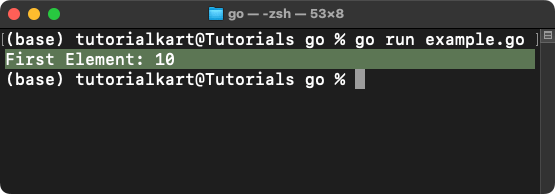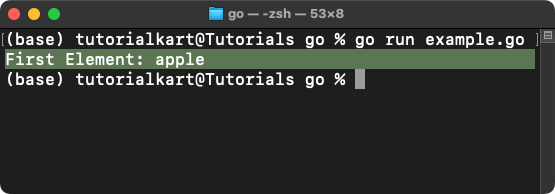Go Slice – Get First Element
In Go, slices are dynamic collections that allow you to access elements by their index. To get the first element of a slice, you simply use the index 0. However, you must ensure that the slice is not empty to avoid runtime errors.
In this tutorial, we will explore how to get the first element of a slice in Go with practical examples and detailed explanations.
Steps to Get the First Element of a Slice
- Check If Slice Is Empty: Ensure the slice has at least one element to avoid runtime errors.
- Access the First Element: Use the index
0to retrieve the first element of the slice. - Handle Edge Cases: Return an error or a default value if the slice is empty.
Examples of Getting the First Element of a Slice
1 Get the First Element of a Slice of Integers
This example demonstrates how to get the first element of a slice of integers:
</>
Copy
package main
import "fmt"
// Function to get the first element of a slice
func getFirst(slice []int) (int, error) {
if len(slice) == 0 {
return 0, fmt.Errorf("slice is empty")
}
return slice[0], nil
}
func main() {
// Declare and initialize a slice
numbers := []int{10, 20, 30, 40, 50}
// Get the first element
firstElement, err := getFirst(numbers)
if err != nil {
fmt.Println("Error:", err)
return
}
// Print the first element
fmt.Println("First Element:", firstElement)
}Explanation
- Validate Slice: The function checks if the slice is empty and returns an error if true.
- Get First Element: The value at index
0is retrieved and returned as the first element. - Print Result: The first element is printed in the main function.
Output

2 Get the First Element of a Slice of Strings
This example demonstrates how to get the first element of a slice of strings:
</>
Copy
package main
import "fmt"
// Function to get the first element of a slice
func getFirst(slice []string) (string, error) {
if len(slice) == 0 {
return "", fmt.Errorf("slice is empty")
}
return slice[0], nil
}
func main() {
// Declare and initialize a slice
words := []string{"apple", "banana", "cherry", "date"}
// Get the first element
firstElement, err := getFirst(words)
if err != nil {
fmt.Println("Error:", err)
return
}
// Print the first element
fmt.Println("First Element:", firstElement)
}Explanation
- Validate Slice: The function checks if the slice is empty and returns an error if true.
- Get First Element: The value at index
0is retrieved and returned as the first element. - Print Result: The first element is printed in the main function.
Output

Points to Remember
- Bounds Checking: Always check if the slice is empty before accessing elements to prevent runtime errors.
- Generic Logic: The same logic can be applied to slices of any type, such as integers, strings, or custom structs.
- Default Values: When the slice is empty, return a default value (e.g.,
0for integers or an empty string for strings) along with an error.
